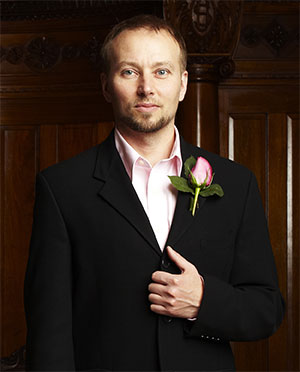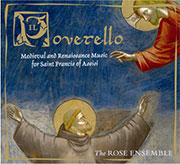
Daniel Hathaway: Jordan, The Rose Ensemble was just here last Spring on CWRU’s Chapel, Court & Countryside series. Might a stop in Cleveland become a yearly event for you?
Jordan Sramek: We have certain cities around the US where we perform regularly and Cleveland is becoming one of them — and that’s exciting. It’s good for a group like ours to take productions on the road. This one is in stark contrast to the last Cleveland program, which was largely middle eastern music. This show is very specific to the life of St. Francis.
DH: Is ‘Il Poverello’ a new production?
JS: We first did a Francis of Assisi program in 2006 and had spent about a year’s worth of research on the project. It was very well received, but it needed more research time in Italy, and more of an instrumental music component. After two more years of work, we did parts of ‘Il Poverello’ in Italy last year. It was so fantastically received that we did more of it there last summer and ended up recording it in the middle of August. The disc will be ready this week — a very quick turnaround. It was exciting to get the impetus from our experiences in Italy. Of course, you can say, well, duh, of course music of St. Francis is going to be well received in Italy. But I think that could also have gone the other way, too.
DH: You produce a large number of programs in a season.
JS: We have a subscription series in the Twin Cities, and sometimes we produce five new programs a season, but we can only tour with a few of them. Because our touring roster is really full, we stick to the tried and true. We try to commit every tour program to memory, which takes a substantial amount of time, because there’s usually huge amounts of text and verses to learn.
DH: Do you come from a musicological background?
JS: No I’m a musician by training, but a lot of the time, you have to pore over the historical sources yourself if the musicologists haven’t done the work. Of course, I’m grateful when they have!
DH: Has anyone else done a recording of this repertory?
JS: There’s one I know of by the great medieval ensemble Altramar, but it’s based on a lot of conjecture. They don’t even use notated music, just text and melodic fragments. This disc is very different. Ours includes music from the time of Francis, but it also explores the musical legacy of the Franciscan order, with music by a number of lesser known composers all the way into the high Renaissance period who belonged to the order of the Franciscan minors. I’m excited that people are going to get to hear Franciscan music in many different respects, from a number of different centuries. Francis was born in the latter part of the 12th century but his cult really didn’t get going until the beginning of 13th. But already pieces of music and poetry were being written about him during his lifetime. He’s a unique person in that respect.
DH: It’s interesting that you’re performing ‘Il Poverello’ within a week of Francis’ feast day.

DH: How many musicians are you bringing?
JS: Fourteen — the whole group, including myself and eleven other singers and two dedicated instrumentalists, including our guest Isacco Colombo from Milan, who will play a whole array of wind instruments. The winds are something very traditional to 13th century Umbria and Tuscany. First and foremost, there’s the bagpipe. Isacco’s instrument, a replica of a medieval Italian bagpipe, is unique, wistful, really the sweetest thing. I’d compare it to the Uilleann pipes in Ireland. It’s not as loud as Scottish bagpipes, but in my opinion there’s no such thing as a quiet bagpipe.
DH: But this one can speak with an indoor voice?
JS: It’s able to play with other instruments without killing them, which is really important. And Isacco also plays pipe and tabor like you’ve never heard before, amazing! Also shawm and recorder. My string player will be using a gut strung Rennaissance lap harp, a rebec (a 3 stringed middle eastern violin), vielle (a medieval fiddle), a copy of a 15th century Spanish instrument. And there will be lots of percussion, including big huge drums, as well as Arabic instruments hearkening to the visit Francis made to Egypt during his lifetime. There will be a lot of folk inspired rhythms and many different dances, interspersed with more choral music sung in early Italian and Latin.
DH: Have you performed in Francis’ home town?
JS: Not yet! But Assisi is a medieval town and loves medieval music. There are churches and pilgrims everywhere. The Rose Ensemble has performed exclusively in and around Milan, but we hope to be invited elsewhere once we release this disc. I was in Assisi in June and there are so many people with an interest in Francis and so many things to buy — books and trinkets and DVD’s — but not one CD. I’m just so excited about letting people know about this music. It has refrains that are very catchy. Last June in Italy, we had halls full of hundreds of enthusiastic Italians just starting to sing along. It was a hoot and I hope it happens again.
The Rose Ensemble’s performance of ‘Il Poverello’ at the Shrine Church of St. Stanislaus in Slavic Village on Sunday is free, but in keeping with the life and mission of Francis of Assisi, the audience is asked to contribute to an offering to be given to the poor.
Read a concert report about the Rose Ensemble’s performance on October 11 on ClevelandClassical.com.


